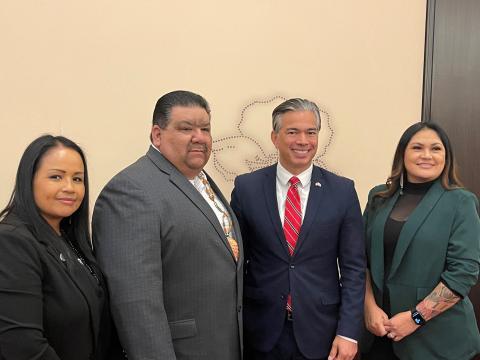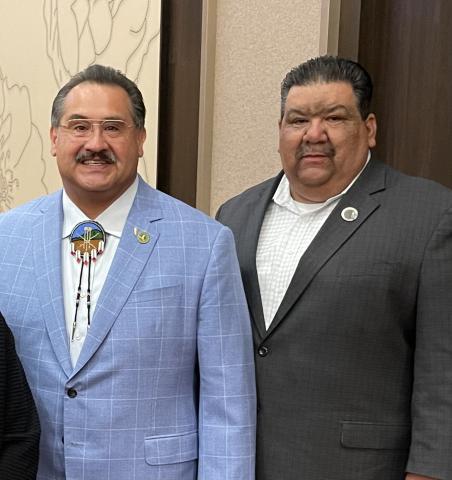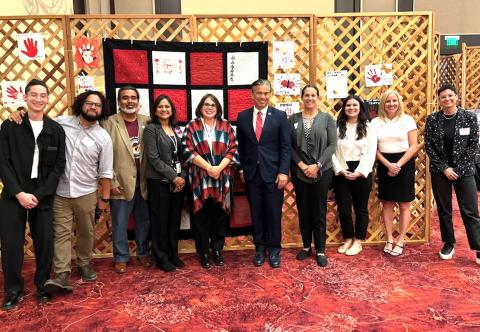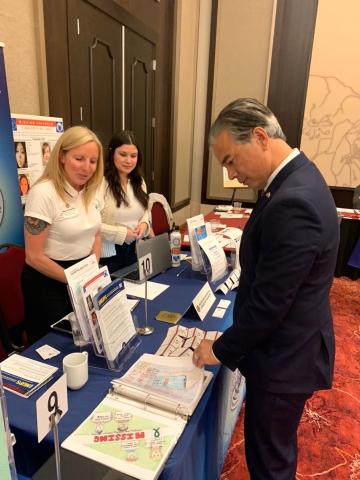California Department of Justice officials and Tribal community members were invited to the Soboba Casino Resort Event Center on Sept. 30 to explore the Missing and Murdered Indigenous Persons crisis and brainstorm on possible solutions.
Missing in California Indian Country events are taking place throughout the four regions of the state, which has more than 700,000 Tribal citizens, the most Native American residents in the country.
This Southern California event resulted from a conversation between the Attorney General’s legal and policy advisor on Tribal affairs Merrie Lopez-Keifer and Soboba Tribal Council Chairman Isaiah Vivanco. The two had been talking about various events the DOJ had hosted in Northern California.
“We thought it would be great to bring something similar to Southern California,” Vivanco said. “Our council agreed to host it and with the support of the DOJ we made it happen.”
This most recent event was developed and planned in collaboration with the Tribal governments and Tribal citizens within Southern California to be most responsive to the region’s Tribal communities’ needs. There are more than 20 federally recognized Tribes in this region. Local, state and federal justice partners have come together for these events to share critical information, resource availability and partnership in addressing the MMIP crisis in California.
The all-day symposium included more than 40 organizations and agencies that offered resources related to human trafficking, victim services, counseling for survivors and family members and more.
“For me, the highlight was all the Southern California Tribal involvement as well as elected officials from not only the state but many Southern California counties, too,” Vivanco said. “This was the first event I know of in Southern California where there were numerous resources and advocates available for discussion. I think providing so much information as to resources available was very helpful.”
Attorney General of California Rob Bonta welcomed everyone to the event and said the unfortunate reality is that many Tribal communities feel under threat, worried that their loved ones will go missing and will be lost to violence and murder. “This is unacceptable,” he said.
A separate room was available for anyone that wanted to privately record a testimonial about themselves or a family member affected by the MMIP crisis. Those that chose to speak publicly were invited to the stage to share their stories. Bertha Fraire of the Cherokee Nation detailed her daughter’s kidnapping and death, stating that no suspects have been identified and brought to justice even after four years.
Fraire said Aleyah Toscano was only 16 when she was abducted from school in Los Angeles County. Having been the victim of stalking in the past, Fraire said she was shocked that school officials did not take more precautions against such a thing happening. She has since dedicated her life to helping other families facing similar fights to hopefully find some closure. “I’m on a journey for justice,” she said. “Let’s start with kids who are still alive and victims of sexual abuse or rape. I stand here with a bleeding heart for all your children, all your families. Let us make a positive change.”
Veronica Cleland of the Iipay Nation of Santa Isabel shared the story of her brother, Forrest “Os” Boren Jr., who went missing in November of 2020 when he was 50 years old. She said the family has still not gotten any answers and continues to search for him. They feel Os was judged and labeled by law enforcement, including Tribal officers, and his disappearance was not taken seriously. She said they received no empathy, no compassion and no help. She said there needs to be transparency between law enforcement agencies working with families of MMIPs and sensitivity training for agencies handling MMIP cases. “We will never stop looking for Os. He has a six-year-old son who is starting to ask questions about his dad,” Cleland said. “We need to stay united in bringing home all our missing relatives. If you know anything, speak up about any missing person case; bring families closure.”
Leilani Thompson, from Barona, said her son went missing under suspicious circumstances in 2015 at the age of 20. A diabetic with long-standing health issues, she said many facts surrounding his disappearance didn’t add up, but that she could not convince El Cajon law enforcement officials that a crime had been committed. Eight years later, Thompson said she is still learning about the process involved with a situation such as this and is still on a mission to find her son. Her family is offering a $50,000 reward to enlist the aid of others in their search for him.
Rhonda Valenzuella shared her personal experiences “on behalf of myself and a family member and as a Soboba Tribal member” hoping to encourage others to report crimes to the authorities. Her brother-in-law Jerome Salgado Jr. went missing in 2016 and she said it was a chore to get constant updates on the investigation. Eventually he was found buried on the reservation which “gave us closure but traumatically tore our family completely apart.” Valenzuella became a victim of violence herself when she was raped three times in her early teens. She didn’t know where or who to turn to, so she kept quiet. Three years ago she was stalked, kidnapped, held against her will and sexually assaulted. She was petrified and when she was finally able to get out of the situation, she was afraid the rape might result in a pregnancy. A good friend helped her and convinced her to get help and report the crime. She contacted a clinic who turned her away because they had no program in place to assist rape victims. She went to a hospital who also did not have the proper resources to help her. She had to go to Riverside where the DOJ had a department within the hospital and after a four hour wait, she underwent an exam. Valenzuella reached out to a neighboring Tribe and the Cahuilla Consortium stepped up to help her. A few days after her ordeal, she still had no contact about her case from law enforcement. She admits all the circumstances that surrounded her ordeal did take a toll. She said there are still a lot of unanswered prayers but there is also hope. “For all of us to come together like this to spread awareness, to let you know that there is stuff that needs to be improved upon like our relationship with the Sheriff’s Department, the police department and with the DOJ. It’s events like this that are going to help mend that relationship. But proactiveness and speaking up and telling your truth? That’s going to make things better,” Valenzuella said.
Three panel discussions were held during the event. The first was a discussion of missing persons investigations and included representatives from several law enforcement agencies. Soboba Tribal Executive Officer Steven Estrada said, “It was good to see the Sheriff, not just from Riverside County but from other Southern California counties, on the stage during that panel. I never thought I would see a collaboration like that just 10 years ago. The presence of other personnel was good to see as well,” he said. “Although processes do not work perfectly, having sheriffs on stage and listening/answering questions shows their willingness to engage in important topics like this.”
Riverside County Sheriff Chad Bianco said there are many reasons why events like this are important. “Over the course of time cultures are developed, some good and some bad. If we ever hope to make positive change, those cultures must come together with the common understanding we are supposed to be making things better, not remain stuck in the quagmire of the past. Meetings like this are important for us to come together with our local Tribal Councils and the community to forge a future of cooperation and trust. We cannot expect to work through rough patches without first developing the relationships fostered by meetings such as this.”
Bianco said it helps everyone involved to be able to be personally engaged and hear the point of view of Tribal community members and understand what his department must do to earn their trust and respect. He added that it is also a perfect opportunity to inform the public of all that law enforcement does in their service to its communities.
Bianco said being able to personally speak with people about, and acknowledge, their concerns was a highlight of the event. “Being able to provide them with answers to questions, or updates to cases they may not have had, is helpful to all of us. Tearing down a wall with a hug and a tear is priceless,” he said.
The January 1 implementation of California’s statewide Feather Alert Program offers a resource to law enforcement agencies investigating any suspicious or unexplainable disappearance of an Indigenous person. The Feather Alert is activated by California Highway Patrol once the law enforcement agency has determined certain criteria has been met. Assembly Bill 1314 was authored by Assemblymember James Ramos who said the high rates of murdered and missing Indigenous persons is a “national tragedy that does not receive the scrutiny and attention that it deserves.” Every member of the community can play an important role in a Feather Alert, which is similar to the existing Amber Alert for missing children and the Silver Alert for missing senior citizens. For more information, www.chp.ca.gov/Pages/Feather-Alert.aspx.
“We have utilized the Feather Alert system on one occasion,” Sheriff Bianco said. “We will continue to work with our legislators to make positive changes through legislation.”
Estrada added that he was impressed by the number of agencies that participated in the panel discussions, hosted resource booths and shared information. The other two panel discussions centered on how to identify signs of human trafficking and MMIP victim services and closing the gap. Traditional opening and closing blessings and cultural sharing was presented by Larry Hammond and Avi-kwa-me Singers and Dancers, Paul Cuero and Kumeyaay Bird Singers and Wayne Nelson and The Southern California Bird Singers.
These Missing in California Indian Country events serve as critical public safety events for Tribal communities and aim to elevate the state’s response to the Missing and Murdered Indigenous Persons crisis. These events allow for loved ones to report an individual missing, receive an update on an active missing person’s case and/or provide a DNA sample for inclusion in the DOJ’s Unidentified Persons Database.
“Regardless of the advancements we have made in law enforcement with our communities, there is still a lot of work to do in order to mend a generations-old barrier of distrust,” Sheriff Bianco said. “We must willingly open ourselves to our Indian communities to build trust and form alliances and friendships.”
Chairman Vivanco said, “Most surprising to me was that a lot of law enforcement officials in the more urban areas were unaware of this issue. It is going to continue to take an educational and collaborative effort to help combat the crisis.”
To participate in the California Department of Justice, Office of Native American Affairs’ anonymous Tribal community survey to share knowledge, experiences and policy recommendations, please visit survey.alchemer.com/s3/7210481/Cal-DOJ-AB-3099-Tribal-Community-Survey, call 916-210-6474 or email Research.Center@doj.ca.gov.
Photos courtesy of the Soboba Band of Luiseño Indians














